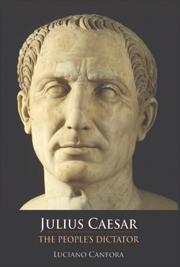Book contents
- Frontmatter
- Contents
- Translators' Note
- Acknowledgements
- Foreword
- PART I FROM SULLA TO CATILINE
- PART II FROM THE TRIUMVIRATE TO THE CONQUEST OF GAUL
- 9 The ‘Three-Headed Monster’
- 10 The Consequences of the Triumvirate: The View of Asinius Pollio
- 11 The First Consulship (59 BC)
- 12 An Inconvenient Ally: Clodius
- 13 Semiramis in Gaul
- 14 The Conquest of Gaul (58–51 BC)
- 15 The Black Book of the Gallic Campaign
- PART III THE LONG CIVIL WAR
- PART IV FROM THE CONSPIRACY TO THE TRIUMPH OF CAESARISM
- Chronology
- Bibliography
- Index
12 - An Inconvenient Ally: Clodius
from PART II - FROM THE TRIUMVIRATE TO THE CONQUEST OF GAUL
Published online by Cambridge University Press: 05 August 2013
- Frontmatter
- Contents
- Translators' Note
- Acknowledgements
- Foreword
- PART I FROM SULLA TO CATILINE
- PART II FROM THE TRIUMVIRATE TO THE CONQUEST OF GAUL
- 9 The ‘Three-Headed Monster’
- 10 The Consequences of the Triumvirate: The View of Asinius Pollio
- 11 The First Consulship (59 BC)
- 12 An Inconvenient Ally: Clodius
- 13 Semiramis in Gaul
- 14 The Conquest of Gaul (58–51 BC)
- 15 The Black Book of the Gallic Campaign
- PART III THE LONG CIVIL WAR
- PART IV FROM THE CONSPIRACY TO THE TRIUMPH OF CAESARISM
- Chronology
- Bibliography
- Index
Summary
Caesar could not ignore the phenomenon of Clodius. If what he wanted was enduring, stable administration of the provinces, the politics of Rome demanded control over the mood, the spirit and any possible murmurs of unrest among the proletarianised and parasitic urban masses, to whom déclassé elements of the ruling stratum not infrequently offered themselves as leaders. In his time Catiline had been one such, and now there was Clodius. Publius Clodius Pulcher, who was born into the patriciate but had become a plebeian – with the authority of Caesar as pontifex maximus – with the sole aim of being elected tribune, was the prototypically unprincipled agitator. His case is a striking illustration of the degeneration of the social struggle in the capital of the empire. He had incited mutiny among Lucullus' troops in the East. Then he had appeared as the accuser of Catiline, but later, apparently, changed sides. The most salient fact of his career, before his election as tribune, was an amorous escapade that ended badly in the house of Caesar, not long after the latter had become pontifex maximus, on the day of the festival of Bona Dea in 62 bc. In his Life of Caesar Plutarch gives a vivid account of this episode, in which Clodius seeks a secret rendezvous with Pompeia, the then wife of Caesar, stressing the fact that according to custom the festival of Bona Dea was celebrated in the house of the pontifex maximus, but in the absence of all the men of the house, including the pontifex.
- Type
- Chapter
- Information
- Julius CaesarThe People's Dictator, pp. 83 - 87Publisher: Edinburgh University PressPrint publication year: 2007



